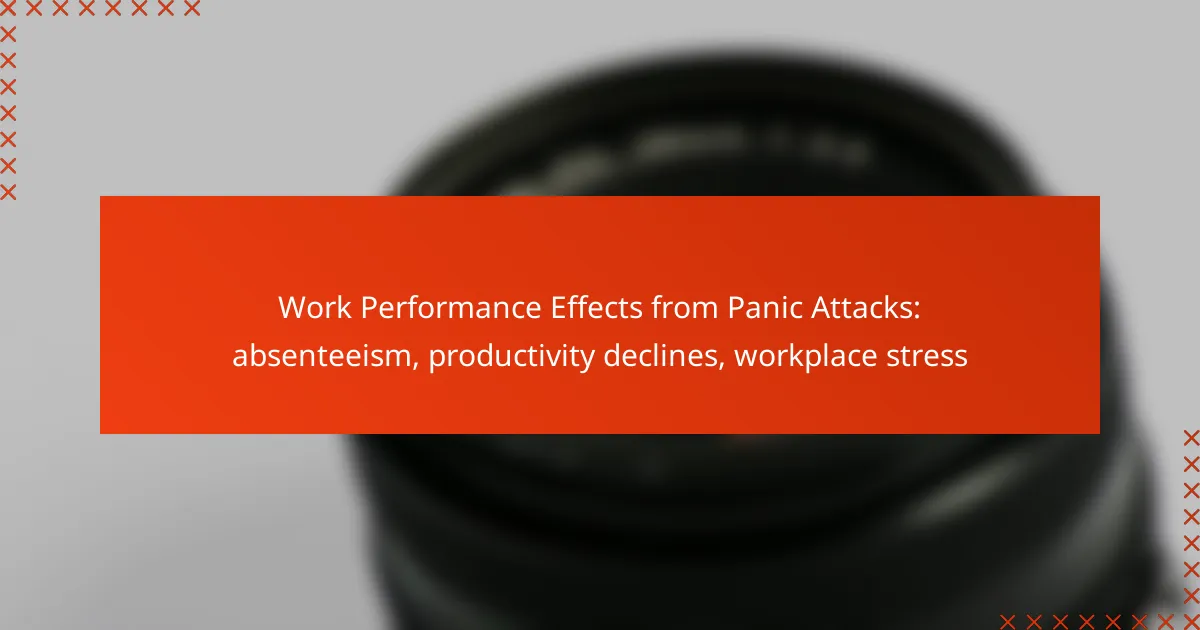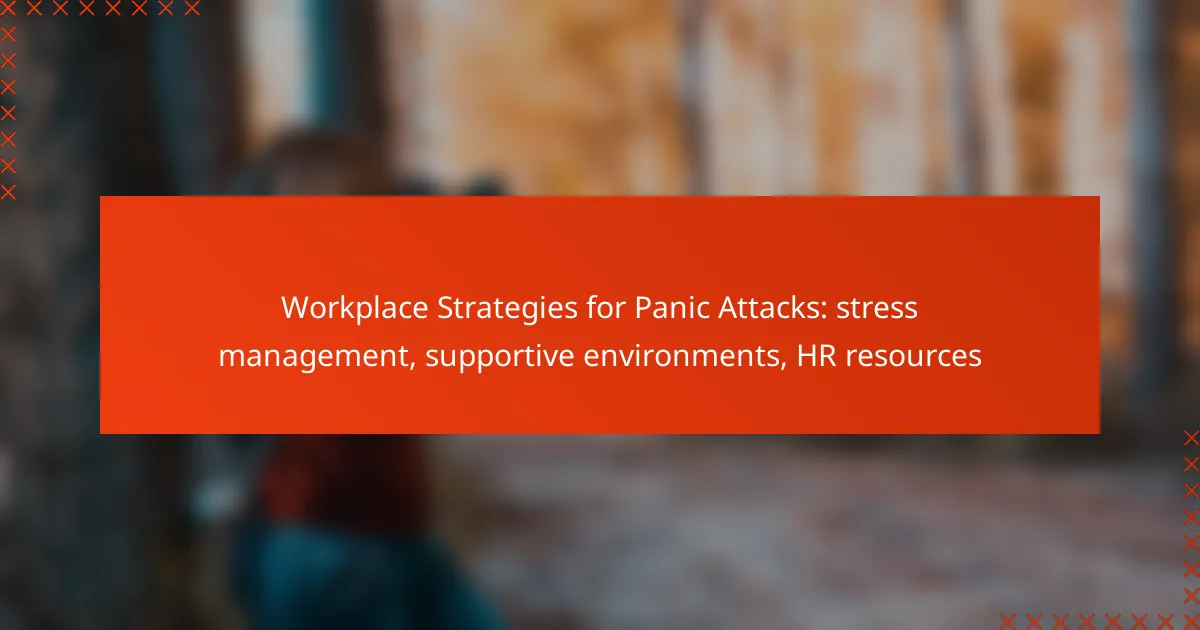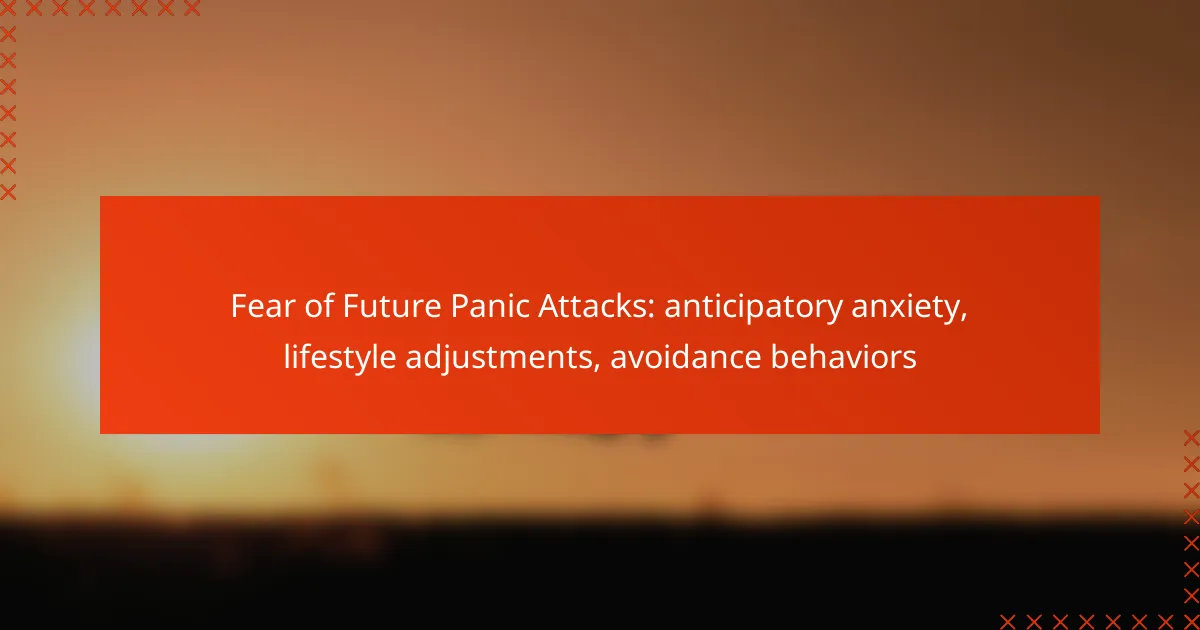Chronic anxiety stemming from panic attacks can create a relentless cycle of worry and emotional distress, affecting daily life and overall well-being. Effective treatments, including Cognitive Behavioral Therapy and lifestyle changes, can help manage symptoms and reduce the emotional toll. By adopting healthier habits and seeking support, individuals can regain control and improve their quality of life.
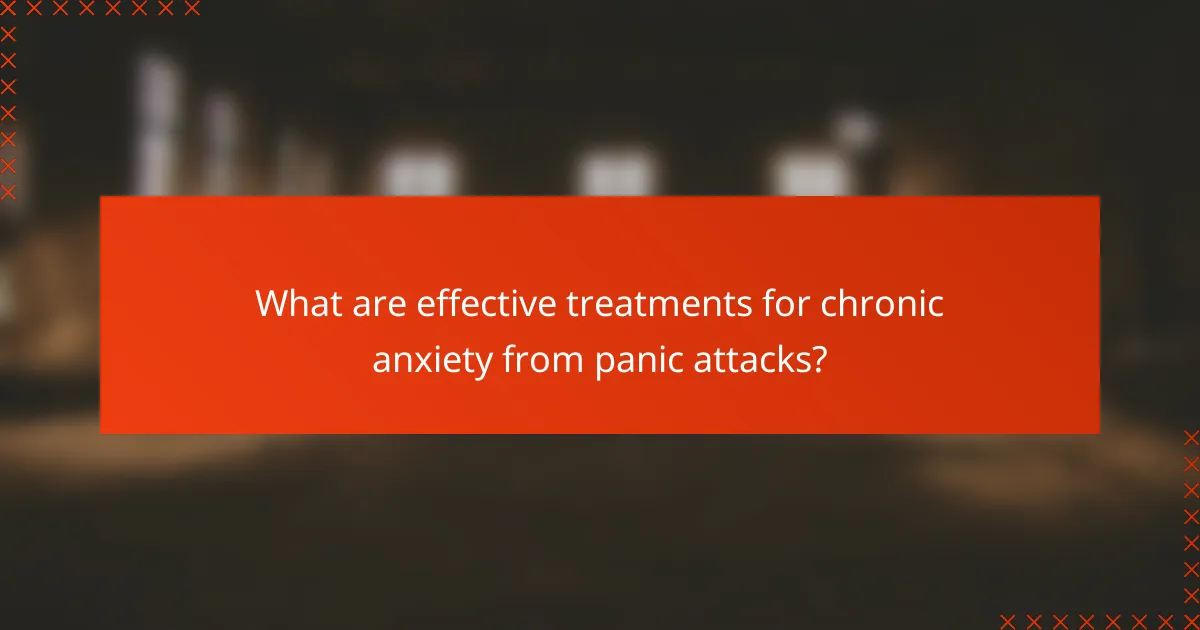
What are effective treatments for chronic anxiety from panic attacks?
Effective treatments for chronic anxiety stemming from panic attacks include Cognitive Behavioral Therapy (CBT), medication options, mindfulness techniques, and support groups. Each approach addresses the emotional toll and ongoing worry associated with anxiety, offering various strategies for management and relief.
Cognitive Behavioral Therapy (CBT)
Cognitive Behavioral Therapy (CBT) is a structured, time-limited approach that helps individuals identify and change negative thought patterns contributing to anxiety. By focusing on the relationship between thoughts, feelings, and behaviors, CBT empowers individuals to develop coping strategies and challenge irrational fears.
Typically, CBT involves weekly sessions lasting around 45-60 minutes, often spanning several weeks to months. Techniques may include exposure therapy, where individuals gradually face their fears in a controlled manner, and cognitive restructuring to reframe negative thoughts.
Medication options
Medication can be an effective component of treatment for chronic anxiety from panic attacks. Common options include selective serotonin reuptake inhibitors (SSRIs) and benzodiazepines, which can help alleviate symptoms. SSRIs are often prescribed for long-term management, while benzodiazepines may be used for short-term relief during acute episodes.
Consultation with a healthcare provider is essential to determine the most appropriate medication, considering potential side effects and interactions. Regular follow-ups can help monitor effectiveness and make necessary adjustments.
Mindfulness and meditation techniques
Mindfulness and meditation techniques can significantly reduce anxiety by promoting relaxation and present-moment awareness. Practices such as deep breathing, progressive muscle relaxation, and guided imagery help individuals manage stress and anxiety symptoms effectively.
Incorporating mindfulness into daily routines, even for just a few minutes, can enhance emotional resilience. Apps and online resources are available to guide users through various mindfulness exercises, making it accessible for anyone seeking relief from anxiety.
Support groups in the UK
Support groups in the UK provide a valuable space for individuals experiencing chronic anxiety from panic attacks to share their experiences and coping strategies. These groups foster a sense of community and understanding, which can alleviate feelings of isolation.
Organizations such as Anxiety UK and Mind offer resources and facilitate peer-led support groups across the country. Participating in these groups can enhance emotional support and provide practical advice on managing anxiety effectively.
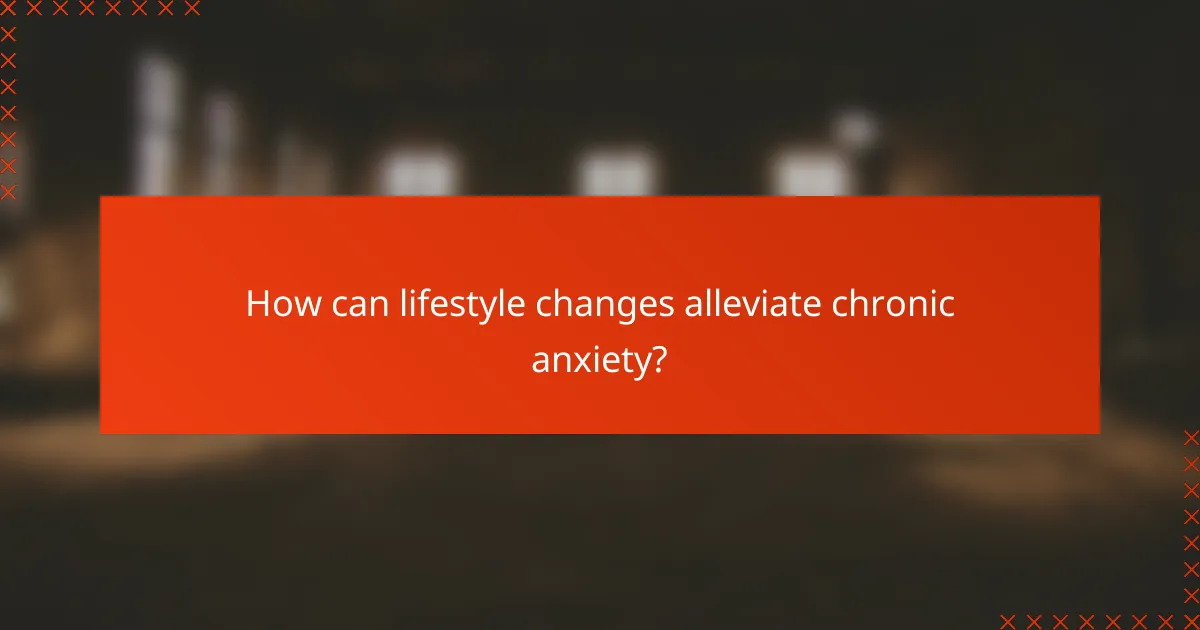
How can lifestyle changes alleviate chronic anxiety?
Lifestyle changes can significantly reduce chronic anxiety by promoting physical health, improving mood, and enhancing overall well-being. Incorporating regular exercise, a balanced diet, and good sleep hygiene can help manage anxiety symptoms and improve resilience against stress.
Regular exercise benefits
Engaging in regular exercise is one of the most effective ways to alleviate chronic anxiety. Physical activity releases endorphins, which are natural mood lifters, and can help reduce feelings of stress and tension. Aim for at least 150 minutes of moderate aerobic activity each week, such as brisk walking or cycling.
Incorporating strength training exercises two to three times a week can also be beneficial. Activities like weightlifting or bodyweight exercises not only improve physical health but can also enhance self-esteem and body image, further contributing to reduced anxiety levels.
Nutrition and diet adjustments
Making thoughtful nutrition and diet adjustments can play a crucial role in managing chronic anxiety. A balanced diet rich in whole foods, including fruits, vegetables, lean proteins, and whole grains, can support brain health and stabilize mood. Consider reducing intake of processed foods, sugar, and caffeine, as these can exacerbate anxiety symptoms.
Incorporating omega-3 fatty acids, found in fish like salmon and walnuts, may also help reduce anxiety. Staying hydrated is essential; aim for at least 2 liters of water daily to maintain optimal brain function and mood stability.
Sleep hygiene practices
Establishing good sleep hygiene practices is vital for alleviating chronic anxiety. Aim for 7 to 9 hours of quality sleep each night by creating a consistent sleep schedule. Going to bed and waking up at the same time daily helps regulate your body’s internal clock.
Creating a calming bedtime routine can also improve sleep quality. This may include activities such as reading, meditating, or taking a warm bath. Avoid screens and stimulants like caffeine in the hours leading up to bedtime to promote better sleep and reduce anxiety levels.
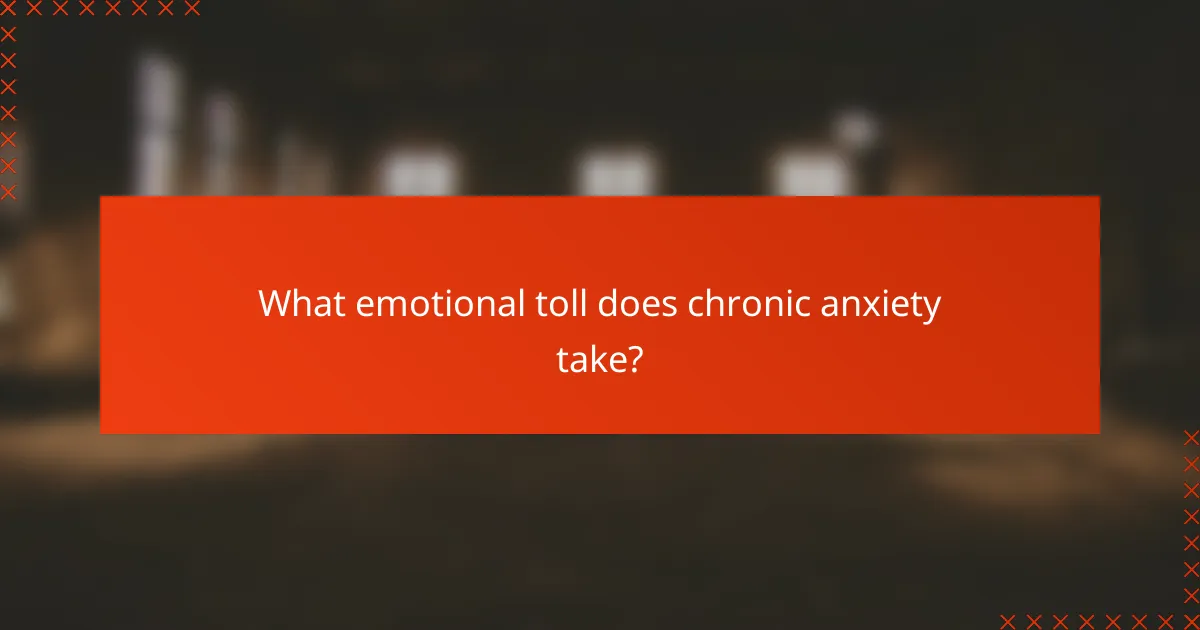
What emotional toll does chronic anxiety take?
Chronic anxiety can significantly impact emotional well-being, leading to persistent feelings of worry, fear, and dread. This ongoing state of unease can strain mental health, making it difficult to engage in daily activities and enjoy life.
Impact on relationships
Chronic anxiety often creates barriers in personal relationships, as individuals may withdraw or become overly reliant on others for reassurance. This can lead to misunderstandings, frustration, and emotional distance between partners, family members, and friends.
Over time, the strain of anxiety can cause loved ones to feel helpless or frustrated, potentially resulting in conflicts or even the dissolution of relationships. Open communication and seeking support can help mitigate these effects.
Effects on work performance
Anxiety can hinder work performance by impairing concentration, decision-making, and productivity. Individuals may find it challenging to meet deadlines or engage in teamwork, leading to increased stress and potential job insecurity.
Employers may notice a decline in performance or increased absenteeism, which can further exacerbate anxiety for the affected individual. Implementing stress management techniques and seeking professional help can improve work-related outcomes.
Long-term mental health consequences
If left unaddressed, chronic anxiety can lead to more severe mental health issues, such as depression or panic disorders. The emotional toll can create a cycle of distress that becomes increasingly difficult to break.
Seeking timely intervention, such as therapy or medication, can prevent these long-term consequences and promote healthier coping mechanisms. Regular self-care practices, including exercise and mindfulness, can also support mental resilience.
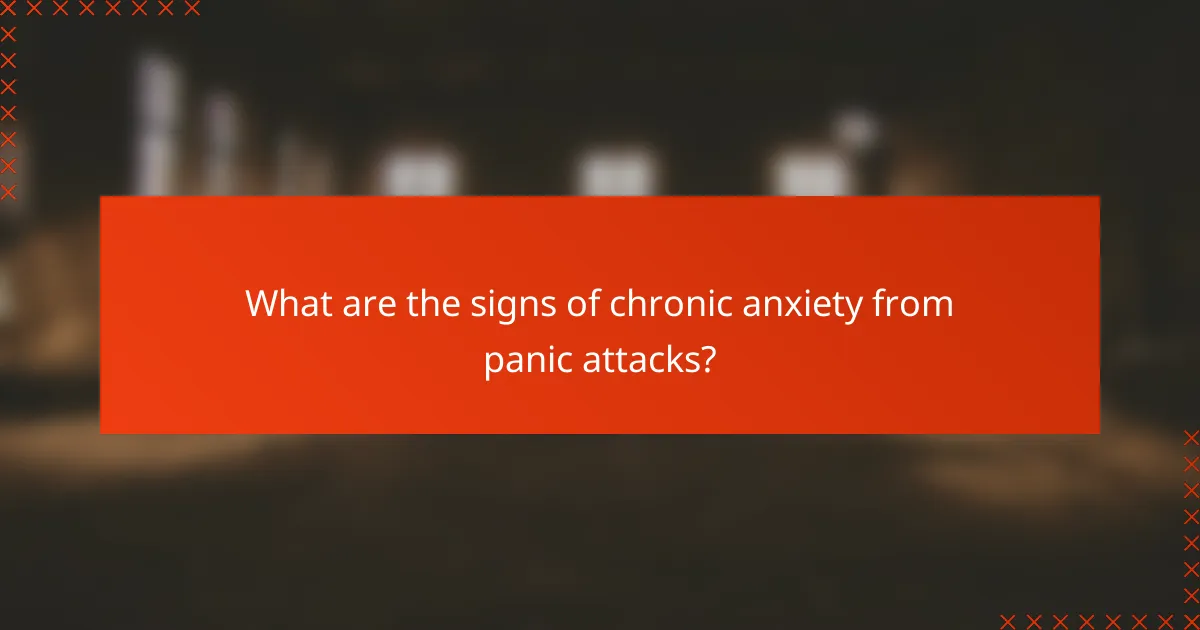
What are the signs of chronic anxiety from panic attacks?
Chronic anxiety stemming from panic attacks is characterized by persistent worry and fear that can significantly impact daily life. Individuals may experience ongoing tension, heightened alertness, and a constant sense of dread, which can lead to various physical and emotional symptoms.
Physical symptoms to watch for
Common physical symptoms of chronic anxiety include rapid heartbeat, shortness of breath, and muscle tension. These symptoms can manifest during panic attacks and may persist even when a person is not actively experiencing an attack.
Other signs to monitor include gastrointestinal issues, such as nausea or diarrhea, and sleep disturbances, which can exacerbate feelings of anxiety. It’s crucial to recognize these symptoms early to seek appropriate help.
Emotional symptoms to recognize
Emotional symptoms of chronic anxiety often involve excessive worry about everyday situations, leading to feelings of helplessness or irritability. Individuals may find it challenging to concentrate or make decisions due to overwhelming fear.
Additionally, feelings of detachment or unreality can occur, making it difficult to engage with the world. Recognizing these emotional signs is essential for addressing the underlying anxiety and seeking effective treatment options.
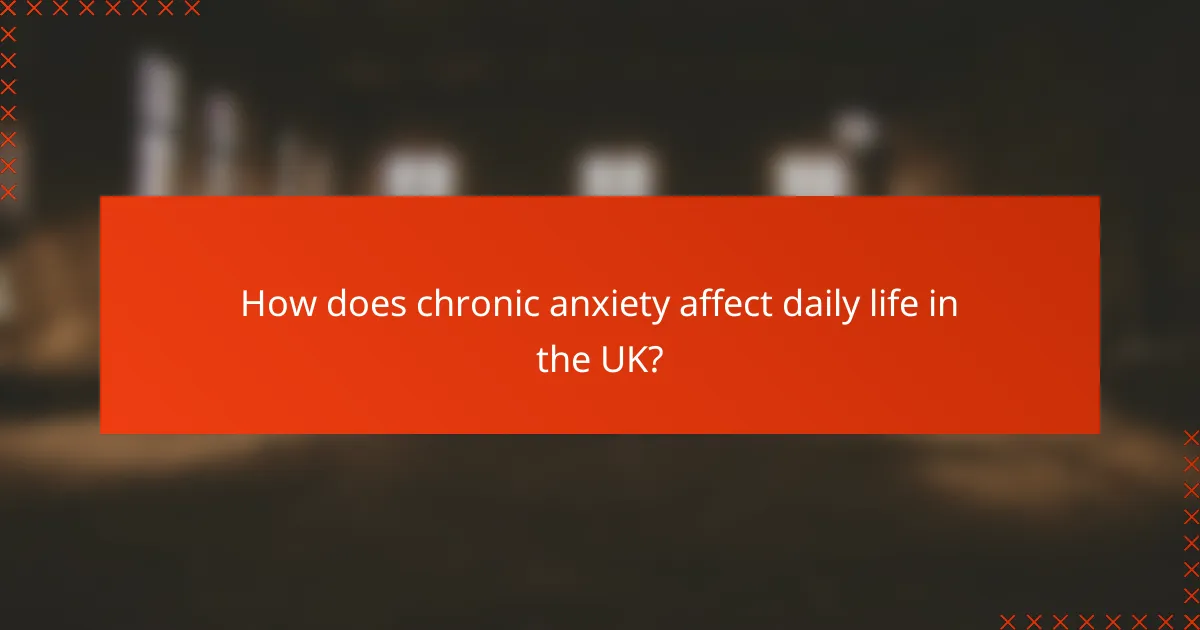
How does chronic anxiety affect daily life in the UK?
Chronic anxiety can significantly disrupt daily life in the UK, leading to ongoing worry and emotional distress. Individuals may experience heightened stress levels that impact their social interactions, work performance, and overall well-being.
Social withdrawal patterns
People suffering from chronic anxiety often exhibit social withdrawal patterns, avoiding gatherings and interactions that may trigger panic attacks. This can lead to isolation, as they may feel overwhelmed in social settings or fear being judged by others.
As a result, relationships with friends and family can suffer, creating a cycle of loneliness and increased anxiety. It is crucial for individuals to recognize these patterns and seek support from loved ones or professionals to maintain social connections.
Changes in routine activities
Chronic anxiety can lead to significant changes in routine activities, as daily tasks may become daunting. Simple errands like grocery shopping or attending appointments can feel overwhelming, causing individuals to avoid them altogether.
To manage these changes, it can be helpful to establish a structured routine that incorporates gradual exposure to anxiety-inducing situations. Setting small, achievable goals can empower individuals to regain control over their daily lives and reduce anxiety levels.
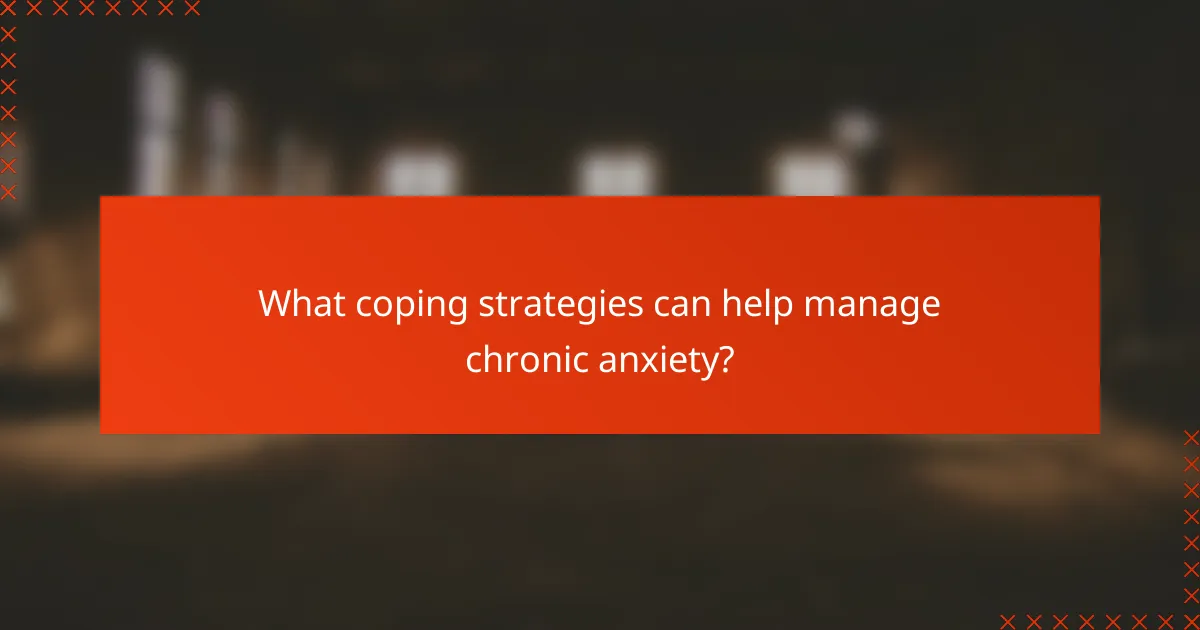
What coping strategies can help manage chronic anxiety?
Effective coping strategies for managing chronic anxiety include a combination of lifestyle changes, therapeutic techniques, and self-care practices. These approaches can help reduce the emotional toll of anxiety and improve overall well-being.
Practice mindfulness and meditation
Mindfulness and meditation can significantly reduce anxiety levels by promoting relaxation and present-moment awareness. Engaging in these practices for just a few minutes daily can help calm the mind and decrease ongoing worry.
Consider starting with guided meditation apps or local classes that focus on mindfulness techniques. Aim for sessions lasting between 10 to 30 minutes, gradually increasing as you become more comfortable.
Engage in regular physical activity
Regular physical activity is a powerful tool for managing chronic anxiety. Exercise releases endorphins, which can enhance mood and reduce stress levels.
Try to incorporate at least 150 minutes of moderate aerobic exercise each week, such as brisk walking or cycling. Find activities you enjoy to make it easier to stick with a routine.
Establish a supportive social network
A strong social support network can help alleviate feelings of isolation and anxiety. Connecting with friends, family, or support groups provides emotional comfort and practical assistance during challenging times.
Make an effort to reach out to others regularly, whether through phone calls, video chats, or in-person meetups. Sharing your experiences can foster understanding and reduce anxiety.
Consider professional help
Seeking professional help from a therapist or counselor can provide tailored strategies for managing chronic anxiety. Cognitive-behavioral therapy (CBT) is particularly effective in addressing anxiety-related issues.
Look for licensed mental health professionals in your area who specialize in anxiety disorders. Many offer sliding scale fees or accept insurance, making therapy more accessible.
Implement healthy lifestyle changes
Making healthy lifestyle changes can significantly impact anxiety management. Prioritize a balanced diet, adequate sleep, and hydration to support mental health.
Aim for a diet rich in whole foods, including fruits, vegetables, lean proteins, and whole grains. Establish a consistent sleep schedule to improve restfulness, targeting 7 to 9 hours of sleep per night.

